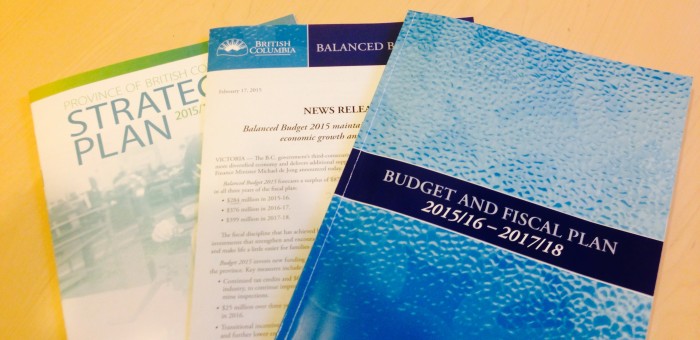My initial reaction to the BC Budget
For anyone who tunes into tonight’s news or picks up tomorrow’s paper, you’ll see the annual flurry of coverage regarding the BC Government’s latest Budget.
While there are many more aspects of this budget that I will continue to explore, I felt it was important to provide you with my initial reaction.
There are some positives aspects to the budget. It takes important steps to continue to address B.C.’s growing debt and makes worthwhile investments into the creative economy, with tax credits for Interactive Digital Media and Digital Animation or Visual Effects. Furthermore I applaud the government for introducing a balanced budget.
Earlier this week I laid out a vision for a 21st century economy – a vision that also requires us to live within our means.
However, a 21st century economy also needs to ensure that the costs facing British Columbians are shared according to our ability to pay. My fear is that this latest budget continues to be balanced on the backs of those who can least afford — the low and middle income earners.
For instance, despite calls to shift MSP premiums into the progressive tax system, the B.C. government has instead once again raised premium rates by another 4%. The rise of user fee rates that disproportionately target low and fixed income earners was accompanied by a tax cut for the top 2% of earners as the 16.8% personal income tax rate that was introduced in 2013 expired.
The government cites the cancellation of the single parent child benefit claw back and the enhancement of the B.C. Tax Reduction credit as examples of supporting low income earners. While these policies represent positive changes, they do little to address the underlying problem that low income earners pay a disproportionately high amount in taxes and fees.
These feel good tax credits come while some families struggle to put food on the table and pay their hydro bills. Instead of addressing the real structural issues that create and perpetuate inequality in our province, this government is complacent.
It’s also important to note that the use of targeted tax credits comes right out of the federal Conservative playbook. It’s a policy used to garner votes and does very little to help British Columbians and to advance a 21 st century vision for our province.
I think British Columbians deserve a different approach. We need real leadership that will help guide British Columbia in the development of a 21st century economy.
This would require a 21st century budget.
A 21st century budget would restructure tax credits and incentives to incentivize the transition to a low-carbon economy. It would use some of the 2014/15 surplus to invest in affordability by, for instance, advancing a housing first strategy to provide stability and support to those in need. It would ensure that government revenue is based upon an equitable, progressive use of our tax system.
A 21st century budget would also take real steps to ensure that we don’t leave anyone behind in this province.





2 Comments
I’m confused how the budget can be ‘balanced” just looking at BC Hydro.
Here are some quotes from the recently released ‘ BC HYDRO SERVICE PLAN 2014/15-2016/17’ (p. 18):
1. “As a provincial Crown corporation, BC Hydro borrows all funds through the Province ,and all of BC Hydro’s debt is either held or guaranteed by the Province.”
So we, the taxpayers, are on the hook for any borrowing decisions by BC Hydro.
2. “BC Hydro forecasted debt net of sinking funds, as of March 31, 2014, to be $15 .6 billion, increasing to $18 .4 billion at the end of fiscal 2017. “
Hydro wants to now increase debt by another 8 billion dollars building Site C? 3. “BC Hydro’s capital expenditure program results in increasing debt levels and, along with higher interest rates, contribute to the increase in finance charges . BC Hydro forecasts finance charges to be approximately $597 million in fiscal 2014 and $838 million in fiscal 2017.”
So last year we, the taxpayers, paid out 597 million dollars to just carry current BC Hydro debt and the plans are to increase this debt by another 8 billion dollars?
Indeed John, the government takes dividends from BC Hydro which means BC Hydro incurs more debt. That debt is serviced by BC Hydro from operating so leads to rate hikes.